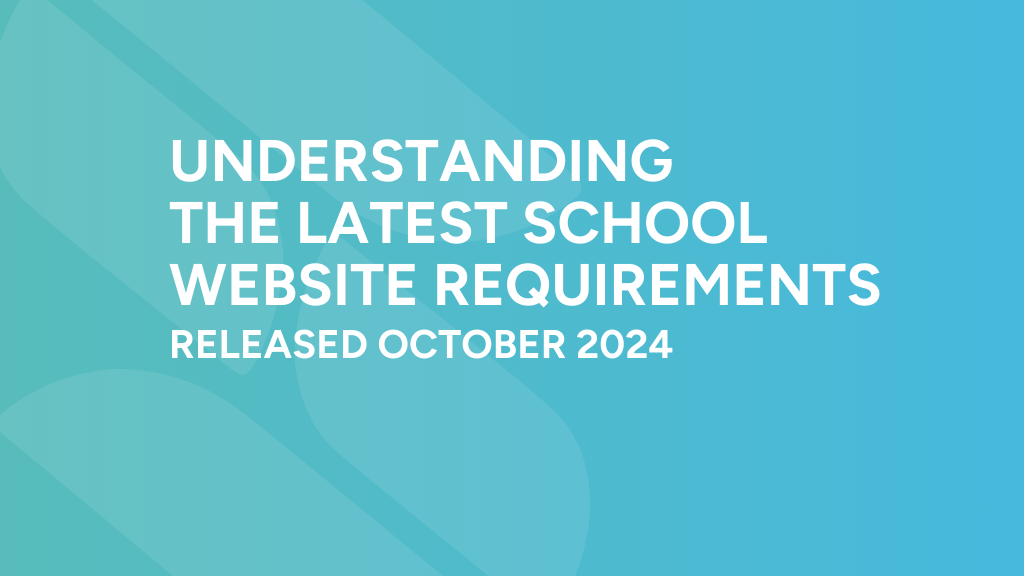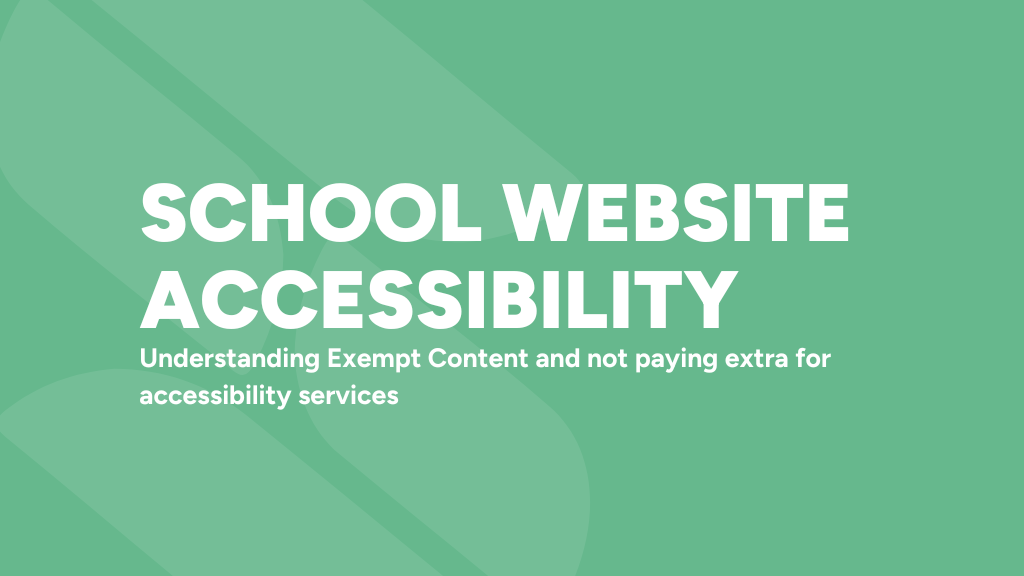Understanding the Latest School Website Requirements for Schools, Academies, Colleges, and Trusts
Understanding the Latest School Website Requirements for Schools, Academies, Colleges, and Trusts
Understanding the Latest School Website Requirements for Schools, Academies, Colleges, and Trusts

The Department for Education (DfE) has introduced updates to the requirements as of October 24, 2024, for information that must be published on school, academy, college, and trust websites. These changes to the latest school website requirements include clarifications on specific policies, governance details, pupil premium, test and assessment results, and more. Below, we break down each requirement and offer actionable guidance to ensure compliance.
Summary of Changes in DfE Website Requirements for Schools, Academies, Colleges, and Trusts
The Department for Education (DfE) has updated requirements on what educational institutions need to publish on their websites. Here are the primary changes:
Complaints Policy
- Maintained Schools: Schools must publish their complaints policy, compliant with section 29 of the Education Act 2002, and provide details on handling complaints for SEN support, as part of the SEN information report.
- Academies and Trusts: Academies must make their complaints procedure available as per the Independent School Standards regulations and publish details on handling complaints regarding SEN support.
Governance Information
- Maintained Schools: Updated to include structure and remit of the governing body, including full names and roles, with attendance records, relevant business interests, and diversity data encouraged. Additionally, schools must publish details for associate members, specifying their voting rights.
PE and Sport Premium
- All Schools and Academies with Primary-aged Pupils: By 31 July, they must publish the amount of funding, a breakdown of spending, impact on participation and attainment, and sustainability plans. The digital form must be converted to HTML to meet accessibility standards.
Pupil Premium
- Maintained Schools and Academies: By 31 December, schools must publish a strategy statement on the DfE template, explaining spending, impact, and education outcomes for disadvantaged pupils. Schools are encouraged to plan spending over three years with annual updates.
Test, Exam, and Assessment Results
- Key Stage 2 (Primary Schools): Schools are no longer required to publish progress scores in reading, writing, and maths for 2023-24 or 2024-25 due to the absence of a baseline from KS1.
- Key Stage 4 (Secondary Schools): The Secretary of State has updated key performance measures, and schools must include Progress 8 and Attainment 8 scores.
- Key Stage 5 (16 to 18): Value-added measures are not required for the 2022-23 academic year due to Covid-related disruptions.
This snapshot provides an overview of the primary updates schools, academies, colleges, and trusts need to incorporate on their websites to stay compliant with the latest DfE standards.
The Specific Changes in the Latest School Website Requirements
1. Complaints Policy
The Complaints Policy requirements now include specific details for handling SEN-related complaints. Below is a comparison of the previous and new requirements.
| Category | Previous Requirements | New Requirements |
|---|---|---|
| Maintained Schools | Schools must publish their complaints policy, compliant with Section 29 of the Education Act 2002. | Schools must publish their complaints policy, compliant with Section 29 of the Education Act 2002.
New: Include details of arrangements for handling complaints specifically related to special educational needs (SEN) support, as part of the SEN information report. |
| No additional requirement regarding SEN complaints was specified. | ||
| Academies and Trusts | All academies and trusts (excluding 16-19 academies) must have a complaints procedure available for parents and carers. | Updated phrasing: Complaints procedure must meet requirements outlined in the Education (Independent School Standards) regulations (2014 Schedule 1, Part 7).
New: Academy schools are now required to publish arrangements for handling complaints related to SEN support in the SEN information report. |
| SEN-related complaints arrangement was not specified for publication. | ||
Actions to Take:
- Maintained Schools: Ensure your complaints policy includes clear guidance on handling SEN-related complaints. Publish this information as part of your SEN information report.
- Academies and Trusts: Confirm that your complaints procedure complies with Independent School Standards. Include specific procedures for SEN complaints in your SEN information report.
2. Governance Information
The Governance Information section has been updated for maintained schools, specifying what details must be published about governors and committee members.
| Category | Previous Requirements | New Requirements |
|---|---|---|
| Maintained Schools | Schools must publish information on their governing body in line with statutory guidance. |
Schools must publish information about the structure and remit of their governing body and any committees, including full names of chairs and each governor’s:
|
| Basic information was generally listed, but not the full detail for each governor. | New: Schools are encouraged to publish diversity data on their governing body and committees. Additionally, they should list relevant interests for associate members and specify their voting rights. |
Actions to Take:
- Maintained Schools: Expand the governance section to include detailed information on each governor and any associate members. Consider including diversity data for transparency and inclusivity.
3. PE and Sport Premium
Updated requirements outline accessibility and format specifics for PE and Sport Premium information for schools and academies with primary-aged pupils.
| Category | Previous Requirements | New Requirements |
|---|---|---|
| All Schools and Academies with Primary-Aged Pupils | Publish funding amount, spending breakdown, and impact on participation. No specific formatting requirements were previously highlighted. | Publish by 31 July:
New: If using the DfE template for reporting, convert the report to HTML format to ensure accessibility compliance. |
Actions to Take:
- All Schools and Academies with Primary-Aged Pupils: Prepare the PE and sport premium report by 31 July each year. If using a digital report format, convert it to HTML for better accessibility.
4. Pupil Premium
The Pupil Premium section now includes guidelines for using the DfE template and updating multi-year plans annually.
| Category | Previous Requirements | New Requirements |
|---|---|---|
| Maintained Schools and Academies | Schools were previously required to publish details of their pupil premium spending and its impact, but no specific template or multi-year planning was emphasised. | Schools must publish a Pupil Premium Strategy Statement on the DfE template by 31 December, covering:
Template ensures compliance and consistency. |
Actions to Take:
- Maintained Schools and Academies: Use the DfE template to publish a clear Pupil Premium Strategy Statement by 31 December. Plan over three years with annual updates to reflect the most recent spending and outcomes.
5. Test, Exam, and Assessment Results
Changes to the Test, Exam, and Assessment Results requirements reflect updates to progress scores and other metrics due to Covid-19 disruptions.
| Category | Previous Requirements | New Requirements |
|---|---|---|
| Key Stage 2 (Primary Schools) | Schools were required to publish KS1 to KS2 progress scores, along with KS2 performance measures, including the percentage of pupils meeting expected and higher standards. | Schools must still publish KS2 performance measures but do not need to publish progress scores for the 2023-24 and 2024-25 academic years, as KS1 baseline data is not available. |
| Key Stage 4 (Secondary Schools) | Schools were required to publish Progress 8 and Attainment 8 scores, GCSE results, and EBacc entry percentages. | The same requirements apply, but the Secretary of State has updated the list of necessary performance measures.
|
| Key Stage 5 (16 to 18) | Schools were required to publish value-added and other progress measures. | Schools are no longer required to publish value-added measures for the 2022-23 and 2023-24 academic years due to Covid disruptions. |
Actions to Take:
- Primary Schools: Publish KS2 performance data but exclude KS1 to KS2 progress scores for the 2023-24 and 2024-25 academic years.
- Secondary Schools: Ensure Progress 8, Attainment 8, and GCSE results are available. Update metrics according to the latest DfE guidelines.
- Secondary Schools with Sixth Forms: Exclude value-added measures for the specified academic years if data is unavailable.
Why do the Latest School Website Requirements state ‘Must’ for Maintained Schools while Academies Only ‘Should’?
In the Department for Education’s (DfE) website requirements, schools often face mandatory requirements marked by the term “must,” while academies and trusts encounter guidelines framed as “should.” This distinction raises questions, particularly for school and academy leaders striving for clarity and consistency.
The Terminology of ‘Must’ vs. ‘Should’
- Must: Indicates a legal obligation or statutory requirement, meaning maintained schools must publish specific content as outlined in the Education Act and other relevant legislation.
- Should: Suggests a recommended action rather than a strict obligation. This is often applied to academies, which are governed by funding agreements with the Secretary of State rather than the same statutory regulations that apply to maintained schools.
Potential Reasons for the Distinction
- Differences in Governance and Accountability
Maintained schools operate directly under local authorities and are thus bound by legislation applicable to public sector bodies. Academies and trusts, however, function independently of local authority oversight and are governed by individual funding agreements. This setup may lead to a more flexible regulatory framework, allowing academies autonomy in meeting certain requirements. - Funding Agreements and Legal Requirements
While maintained schools’ compliance is often legally binding through the Education Act, academies operate based on their funding agreements, which outline expected standards and responsibilities. Although these agreements can require compliance with similar DfE guidelines, they generally offer academies more discretion over operational matters. - Encouraging Best Practice vs. Enforcing Compliance
By framing guidelines as “should” rather than “must” for academies, the DfE might be encouraging academies to adopt best practices without imposing a one-size-fits-all approach. This may reflect the DfE’s intention to uphold standards across different types of educational institutions while allowing academies some flexibility to adapt according to their unique structures and governance. - Freedom to Innovate
A central principle of the academy model is the freedom to innovate and tailor practices to meet their communities’ needs. The DfE’s use of “should” may be aimed at supporting this flexibility, enabling academies to implement DfE guidance in a way that aligns with their educational vision while still meeting fundamental educational standards.
Awaiting Clarification from the DfE on the Latest School Website Requirements
We recognise that this variation in terminology can cause uncertainty, especially for trusts working to maintain transparent and informative websites. We have reached out to the DfE for clarification and await their guidance.
In the meantime, we advise that academies and trusts approach DfE guidelines proactively, implementing “should” requirements wherever feasible to align closely with best practices expected across the educational sector. This approach ensures they are not only compliant but also providing the information needed by parents, students, and their communities.
Final Note
These DfE updates reflect the evolving requirements for educational transparency and accountability. For schools, academies, colleges, and trusts, proactively implementing these updates ensures not only compliance but also supports a transparent, accessible, and engaging online presence for students, parents, and communities.
As requirements evolve, we’ll continue to provide updates and detailed guidance to keep your websites compliant and accessible. For any further questions, please reach out, and we’ll assist in aligning your content with DfE standards.







